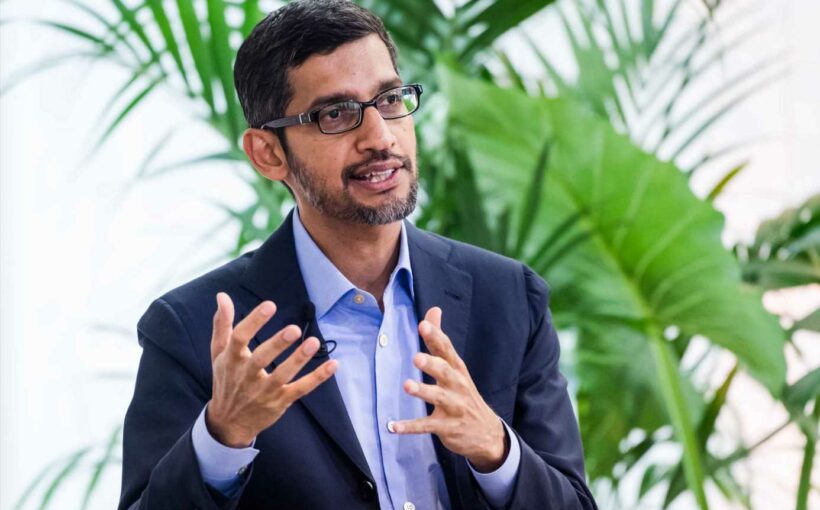CEO Sundar Pichai is stressed about Google's plan to become carbon free over the next decade. That means the company aims to use no carbon-based energy whatsoever by 2030.
"It's a long shot, it stresses me out in terms of how to get there," Pichai said at a virtual climate change event hosted by earth-imaging platform Planet in July. But "you bet on technology and innovation," he said.
Google has been carbon neutral since 2007, Pichai said. That means that though Google's operations still create carbon emissions, the company compensates by doing things like buying carbon offsets. With offsets, Google is essentially paying other organizations or projects to actually decrease greenhouse gas emissions in an equal amount to what Google is producing. Google also uses other methods to compensate, like buying enough renewable energy to match its annual carbon-based electricity use.
By 2030, however, Google aims to operate without using any energy that produces greenhouse gas emissions. "We have committed to be 24-7 carbon free — that is every hour, every day around the world," Google will operate using clean energy, Pichai said.
That means "every email people use in Gmail, or every query they type in search, we want to serve it without using carbon at all," Pichai said. "These are bold bets. And we think of these as moonshots."
Google is also developing tools to help consumers save energy.
Later this year, for instance, the default routes suggested by Google Maps will be "the most eco-friendly routes" whenever possible, Pichai said. An eco-friendly route suggestion is one that is optimized for things like less steep roads and less traffic congestion, so that driving the route would likely require less fuel.
Google is also "trying to simulate weather better, so better predict…adverse weather events, so that people can plan for it," Pichai said.
Google's plans are no easy feat, though.
"It's a good thing that Sundar Pichai is stressed about meeting their 2030 carbon zero goal," says Greenpeace special projects manager Rolf Skar. "Too many companies, and governments, have set goals and not achieved them."
According to Julio Friedmann, a senior research scholar at the Center on Global Energy Policy at Columbia University, Google's goals are "doable, but very ambitious and require attention, sustained commitment and investment to succeed. Glad he's on the case," he says.
For instance, Google will need to "innovate and push for systemic changes in regions where solutions aren't readily available," says Skar.
In Taiwan and Singapore, for example, challenging geography complicates using wind and solar power, both of which require land area to produce. So in Taiwan, Google will buy power from from 40,000 solar panels elevated over fishing ponds. In Singapore, it plans to buy power from rooftop solar installations on 500 public housing buildings, the company says.
And for those times when the wind doesn't blow and the sun doesn't shine, Google is also working on solutions, the company says. Google partnered with clean-energy start-up Fervo, for instance, to develop a next-generation geothermal power project to power the company's data centers and other infrastructure throughout Nevada. Geothermal power draws on energy from the naturally occurring heat generated by the core of the earth.
Google's carbon-free goals are "the right level of ambition," Elizabeth Sturcken, the managing director of the Environmental Defense Fund, tells CNBC Make It. "We have no other choice than to utterly transform our energy systems and economy to reduce planetary emissions by 50% in less than 10 years," she says.
To be fair, being sustainability focused is also good for Google.
For one thing, it helps the company hire and keep young talent. "Bar none, when you look at the next generation coming in, this is the issue they care the most about," Pichai said.
Also, the price of renewable energy has tumbled in recent years, so it's in Google's best interest to transition its electricity sources, says Mark Z. Jacobson, a professor at Stanford who wrote a textbook on renewable energy and who is the director of the Atmosphere/Energy Program there.
"It is definitely cheaper for companies to transition themselves," says Jacobson — wind and solar are almost half the cost of natural gas, he says. "So meeting the 100% renewable energy, zero-carbon goals benefits the companies themselves financially."
See also:
Google CEO Sundar Pichai: Climate is 'bar none' the No. 1 concern for young people
Miami's first-ever chief heat officer: These are the climate issues that scare me the most
China, Elon Musk raise alarm about bitcoin energy use: Here's how it could be made more 'green'
Sign up now: Get smarter about your money and career with our weekly newsletter
Source: Read Full Article
